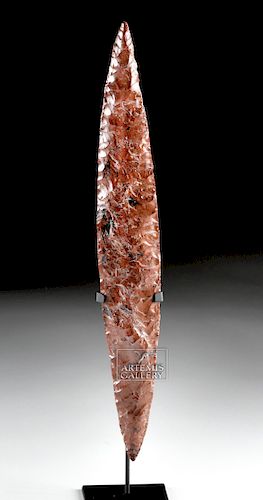Large Colima Mahogany Obsidian Spear Blade
Lot 146b
About Seller
Artemis Gallery
686 S Taylor Ave, Ste 106
Louisville, CO 80027
United States
Selling antiquities, ancient and ethnographic art online since 1993, Artemis Gallery specializes in Classical Antiquities (Egyptian, Greek, Roman, Near Eastern), Asian, Pre-Columbian, African / Tribal / Oceanographic art. Our extensive inventory includes pottery, stone, metal, wood, glass and textil...Read more
Estimate:
$1,200 - $1,700
Absentee vs Live bid
Two ways to bid:
- Leave a max absentee bid and the platform will bid on your behalf up to your maximum bid during the live auction.
- Bid live during the auction and your bids will be submitted real-time to the auctioneer.
Bid Increments
| Price | Bid Increment |
|---|---|
| $0 | $25 |
| $300 | $50 |
| $1,000 | $100 |
| $2,000 | $250 |
| $5,000 | $500 |
| $10,000 | $1,000 |
| $20,000 | $2,500 |
| $50,000 | $5,000 |
| $100,000 | $10,000 |
| $200,000 | $20,000 |
About Auction
By Artemis Gallery
Feb 21, 2019
Set Reminder
2019-02-21 10:00:00
2019-02-21 10:00:00
America/New_York
Bidsquare
Bidsquare : Exceptional Antiquities, Asian, Ethnographic
https://www.bidsquare.com/auctions/artemis-gallery/exceptional-antiquities-asian-ethnographic-3858
An important one-day auction featuring museum-worthy examples of Egyptian, Greek, Roman, Etruscan, Near Eastern, Far East / Asian, Pre-Columbian, African / Tribal, Oceanic, Native American, Spanish Colonial, Russian, Fossils, Ancient Jewelry, Fine Art, so much more! Artemis Gallery info@artemisgallery.com
An important one-day auction featuring museum-worthy examples of Egyptian, Greek, Roman, Etruscan, Near Eastern, Far East / Asian, Pre-Columbian, African / Tribal, Oceanic, Native American, Spanish Colonial, Russian, Fossils, Ancient Jewelry, Fine Art, so much more! Artemis Gallery info@artemisgallery.com
- Lot Description
Pre-Columbian, West Mexico, Colima, ca. 300 BCE to 300 CE. A stunning spear point of a substantial size carved from a mottled red chunk of mahogany obsidian (volcanic glass with iron inclusions). The piece is finely-shaped, with an elongated presentation boasting symmetrically knapped points on both ends, obviously intended to be an impressive object of prestige given its large scale. A rather unusual example, not only for its size and the rarity of the stone source, but also because we do not often see obsidian blades created by the Colima. Custom museum-quality display stand included. Size: 1.6" W x 11.5" H (4.1 cm x 29.2 cm); 12.7" H (32.3 cm) on included custom stand.
Obsidian - "iztli" to the indigenous - fascinated the ancient Mesoamericans; the Aztecs even had a god, Tezcatlipoca, who was the Lord of the Smoking Obsidian Mirror. The shockingly sharp edges and points of this piece demonstrate its great allure. In a world without metal, this sharp quality was especially important for ceremonies of ritual bloodletting and human sacrifice. The difficult-to-obtain material came from volcanic sources in the Sierra Madre of Mexico and in Guatemala, was traded across hundreds of miles to meet the demand for sharp cutting tools and ritual objects, and was struck using a deer antler or small hammer stone to form blades and other shapes. The Colima buried their dead in shaft tombs deep below their residences, alongside the remains of their ancestors. These tombs were richly furnished with ceramic figures, vessels, offerings, and precious stone items of jade and obsidian.
Provenance: private Colorado, USA collection; ex-private Sevilla collection, Pomona, California, USA
All items legal to buy/sell under U.S. Statute covering cultural patrimony Code 2600, CHAPTER 14, and are guaranteed to be as described or your money back.
A Certificate of Authenticity will accompany all winning bids.
We ship worldwide and handle all shipping in-house for your convenience.
#143987Minor abrasions to both faces, and very small nicks to areas of blade edges, otherwise intact and excellent.Condition
- Shipping Info
-
All shipping is handled in-house for your convenience. Your invoice from Artemis Gallery will include shipping calculation instructions. If in doubt, please inquire BEFORE bidding for estimated shipping costs for individual items.
-
- Buyer's Premium



 EUR
EUR CAD
CAD AUD
AUD GBP
GBP MXN
MXN HKD
HKD CNY
CNY MYR
MYR SEK
SEK SGD
SGD CHF
CHF THB
THB














